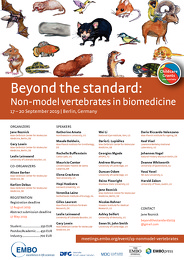About the Workshop
The use of animal models is essential for novel scientific discoveries including the development of therapeutics to combat human disease. The scientific community employs a standard set of animal models to study normal and diseased processes in systematic ways, allowing for greater reproducibility and access to resources. Despite the validity of this approach its narrow scope often excludes incredible biodiversity, which has evolved exquisite, clever and often curious ways to adapt the organism to its environment. With the advent of new technologies including CRISPR/Cas9 for genomic manipulation, IPSCs for in vitro study of numerous cell types and a plethora of “omics” technologies and bioinformatics, the opportunities for non-model organisms in biomedicine have become increasingly accessible. These animals demonstrate the flexibility of biological systems providing insights into abnormal or diseased states and offer unprecedented translational discovery paths. This workshop will bring together international experts working with a range of non-traditional species within biomedicine with the aim to create new research bridges, focusing on vertebrates with unique sensory adaptions, social behaviors and metabolic adaptations for surviving in extreme environments. With novel technologies becoming readily available, this workshop is very timely to inspire researchers to look beyond the ‘standard’.
About EMBO Courses and Workshops
EMBO Courses and Workshops are selected for their excellent scientific quality and timelines, provision of good networking activities for all participants and speaker gender diversity (at least 40% of speakers must be from the underrepresented gender).
Organisers are encouraged to implement measures to make the meeting environmentally more sustainable.






